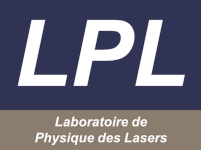with high Spectral Purity
| Phd proposal at Laboratoire de Physique des Lasers (Ecole doctorale Galilée) |
Study of an Autonomous, Transportable Optical Frequency Reference
Key words: Optical frequency metrology, Laser stabilization, Photonics, Sub Doppler spectroscopy, Brillouin fibre laser
Context of the Thesis:
The TranStab project which is granted by ANR brings together two academic laboratories (LPL/CNRS-USPN and Institut FOTON/CNRS-UR) and an industrial company (Thales TRT) over a three-year period to design and demonstrate compact devices used for frequency stability transfer from an optical reference at 1.5 µm towards different wavelengths having scientific and industrial interest ranging from near-IR to visible. One of the TranStab goals is to meet the growing need for stable laser sources for applications in high-sensitivity detection and quantum technologies.
One of the devices developed in this project is a ring cavity made from 200 m of fiber, stabilized by locking the frequency of one of its modes to a frequency reference at 1.5 µm [1]. The frequency stability of the reference is transferred to a target laser whose frequency is locked to another mode of the cavity. The 1.5 µm frequency reference is based on the detection of a molecular transition in acetylene detected in saturated absorption [2].
We have found that it is very easy to generate a Brillouin laser in the cavity with an extremely narrow linewidth [3]. We propose to use this laser effect to probe the acetylene transition and stabilize the cavity. The frequency reference and stability transfer device are thus combined in a compact assembly, taking advantage of both the narrowness of the Brillouin laser emission line and the long-term stability of the acetylene transition. This system will enable us to produce an autonomous reference with high spectral purity, once the low-frequency technical noise has been corrected. The fundamental noise characteristics of this Brillouin laser can then be studied.
The aim of this thesis is to implement this original approach. The work will be divided into three parts:
- The first part of the thesis will be devoted to studying the generation of the Brillouin laser in the cavity. In particular, it will identify the parameters that are important for its control and optimization.
- The second part will involve using the Brillouin laser to interrogate the acetylene transition detected in saturated absorption, and demonstrating that its frequency can be locked to the transition via cavity stabilization.
- The third part will be devoted to characterizing the laser’s fundamental noise by correcting the system’s technical noise. For this last part, we will implement a simultaneous correction of the cavity noise with respect to the molecular transition, as well as a correction of the Brillouin pump noise with respect to the cavity.
The Transportable Metrology team’s expertise in laser and fiber cavity stabilization techniques will be a key asset in the successful completion of this thesis.
Expected skills:
- Taste for experimental and collaborative work.
- Knowledge of fiber devices and laser instrumentation.
- Notions of analog electronics, signal processing and servo control would be appreciated.
References:
[1] T. Steshchenko et al., Limitations of the frequency stability transfer in the near infrared using a fiber-based ring cavity, OL 47, 5465-5468, 2022 doi:10.1364/OL.472887
[2] K. Manamanni et al., Limitations due to residual interferences in fiber-based optical frequency reference at 1.55 µm, JOSA B 39(2) 438-443, doi.org/10.1364/JOSAB.442302, 2022
[3] Y. Souidi et al., “Low-noise and high-gain Brillouin optical amplifier for narrowband active optical filtering based on a pump-to-signal optoelectronic tracking,” Appl. Opt. 55, 248-253 (2016)
Thesis informations:
Supervision: Dr. Vincent RONCIN (Associate Pr. HDR), Head of Transportable Metrology Team
Location : Laboratoire de physique des lasers (LPL)
99 avenue Jean-Baptiste CLEMENT – 93430 VILLETANEUSE
Research topics: Metrology, Molecules and Fundamental Tests
Working hours: 100%.
Duration of thesis: 36 months
Financing : ANR TRANSTAB
See the PhD proposition here
